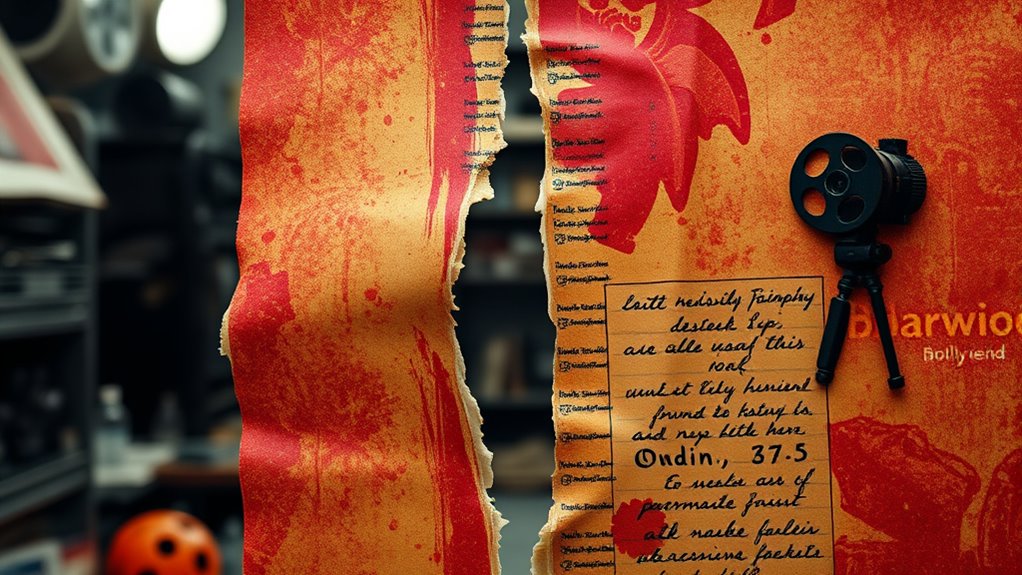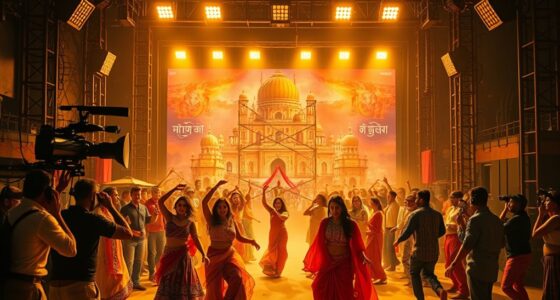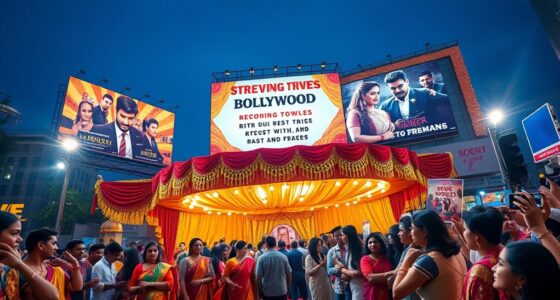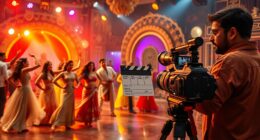Bollywood often faces debates over whether its films are inspired by or directly copy existing works. Controversies highlight claims of similarities in music, scripts, and storylines, blurring the line between homage and plagiarism. Some filmmakers borrow ideas with permission, while others face legal battles for unlicensed use. These disputes impact industry reputation and viewer trust. To understand how Bollywood navigates this fine line, you’ll find more examples and insights if you continue exploring.
Key Takeaways
- Bollywood frequently faces debates over whether films are inspired by or copy existing works, especially regarding music and scripts.
- Notable controversies include songs resembling international hits and scripts closely mirroring classic stories or other films.
- Legal battles often arise from unlicensed music usage, blurring the line between homage and copyright infringement.
- Industry critics highlight the challenge of distinguishing genuine inspiration from outright copying, impacting reputation and creativity.
- These controversies emphasize the importance of originality and proper rights management for Bollywood’s growth and credibility.
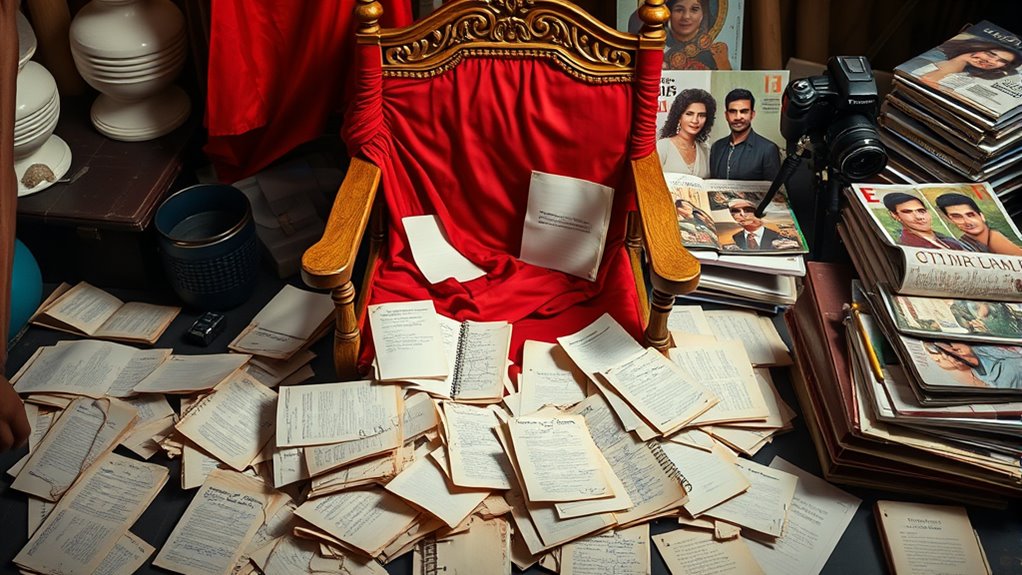
Plagiarism controversies have frequently shaken Bollywood, sparking debates over originality and artistic integrity. When it comes to film production, issues surrounding music rights and script originality are at the heart of many disputes. You might wonder how these conflicts arise and what they reveal about the industry’s stance on creativity. Often, accusations of copying stem from allegations that a song’s melody closely resembles an earlier composition or that a screenplay borrows heavily from a prior work without proper acknowledgment. Such claims not only threaten the reputation of filmmakers but also raise questions about the industry’s respect for intellectual property rights.
Music rights, in particular, have become a hot-button issue. Bollywood has a long history of adopting tunes from international songs, sometimes sparking legal battles over copyright infringement. When a song’s tune or beat sounds strikingly similar to an existing track, the original artists or composers may accuse the filmmakers of unauthorized use. These disputes become more complex if the music rights haven’t been properly cleared before the song’s release. As a viewer, you might notice how some films face backlash simply because they allegedly used music without securing the necessary permissions, highlighting how essential proper licensing is in safeguarding creativity and fairness.
Bollywood faces backlash when films use music without proper licensing, risking legal issues and creative integrity.
Script originality is another indispensable factor in these controversies. Bollywood scripts often draw inspiration from classic tales, novels, or even other films. However, when a screenplay mirrors another work too closely—whether in story structure, character arcs, or dialogues—accusations of plagiarism surface. Sometimes, filmmakers claim their work is inspired by existing stories, but critics and audiences look for genuine innovation. If a film appears to copy plot points or dialogue from a previous hit without giving credit, it tarnishes the industry’s reputation for originality. As someone who appreciates storytelling, you might feel disappointed when you sense a lack of fresh ideas, especially when it seems like films aren’t making enough effort to bring new narratives to the screen.
These disputes over music rights and script originality underscore a larger debate about the boundaries of inspiration versus copying. Bollywood’s rich history of borrowing and adapting is well-known, but the line between homage and plagiarism can be blurry. When controversies erupt, they remind industry insiders and audiences alike that respecting intellectual property is essential for fostering genuine creativity. As a viewer, you’re left questioning whether these films truly offer something new or simply rely on past successes. Ultimately, these debates serve as a reminder that originality and proper rights management are essential for the growth and integrity of Bollywood’s artistic landscape.
Frequently Asked Questions
How Do Bollywood Filmmakers Typically Defend Allegations of Plagiarism?
When faced with plagiarism allegations, Bollywood filmmakers usually rely on a creative defense, claiming their work is inspired rather than copied. They often argue that industry norms permit such adaptations and that similarities are coincidental or unintentional. By emphasizing their originality and citing creative freedom, they try to dismiss accusations, maintaining that their films are unique contributions within the broader context of Bollywood’s evolving storytelling landscape.
Are There Legal Consequences for Plagiarism in Bollywood?
Yes, there are legal consequences for plagiarism in Bollywood. If you commit copyright violations or infringe on intellectual property rights, you can face lawsuits, fines, or even criminal charges. Filmmakers often get sued for copying scenes, music, or storylines without permission. The legal system aims to safeguard creators’ rights, so you should always guarantee originality or obtain proper licenses to avoid serious legal trouble.
Which Bollywood Movies Faced the Most Public Backlash Over Copying?
You should know that movies like “Lonely Planet” and “Ram-Leela” faced significant public backlash over copying. These copyright disputes sparked debates about creative originality in Bollywood, with fans criticizing the lack of innovation. When movies copy too closely, it damages reputations and sparks controversy. As an audience, you expect originality, and these controversies highlight the fine line between inspiration and plagiarism in the industry.
How Does Plagiarism Impact a Filmmaker’s Career in Bollywood?
Plagiarism can seriously harm your career in Bollywood by damaging your creative integrity and eroding audience trust. When you’re caught copying, critics and fans lose confidence in your originality, making it harder to get support for future projects. This fallout can lead to fewer opportunities, blacklisting, or a tarnished reputation that’s tough to repair. Staying true to your creativity helps maintain your credibility and keeps your audience engaged.
What Measures Are Being Taken to Prevent Plagiarism in Bollywood?
You can see Bollywood increasing efforts in copyright enforcement and plagiarism detection to prevent copying. Filmmakers now use advanced software to identify similarities and protect original work. Authorities are stricter about copyright violations, and legal actions are more common against plagiarists. These measures aim to curb copying, encourage originality, and uphold creative integrity in the industry, helping filmmakers safeguard their ideas and build a trustworthy reputation.
Conclusion
So, next time you see a film that feels too familiar, remember the line between inspiration and imitation. Recognize the controversy, question the originality, and appreciate the creativity. Whether it’s a copy or a spark of inspiration, it’s a reminder that Bollywood’s magic lies in its storytelling—whether borrowed or born. Ultimately, it’s your choice to enjoy the familiar, challenge the new, and see beyond the surface. After all, art is what you make of it.
